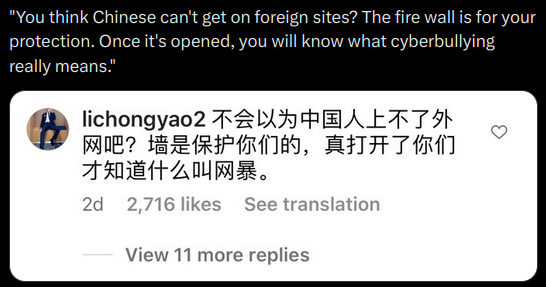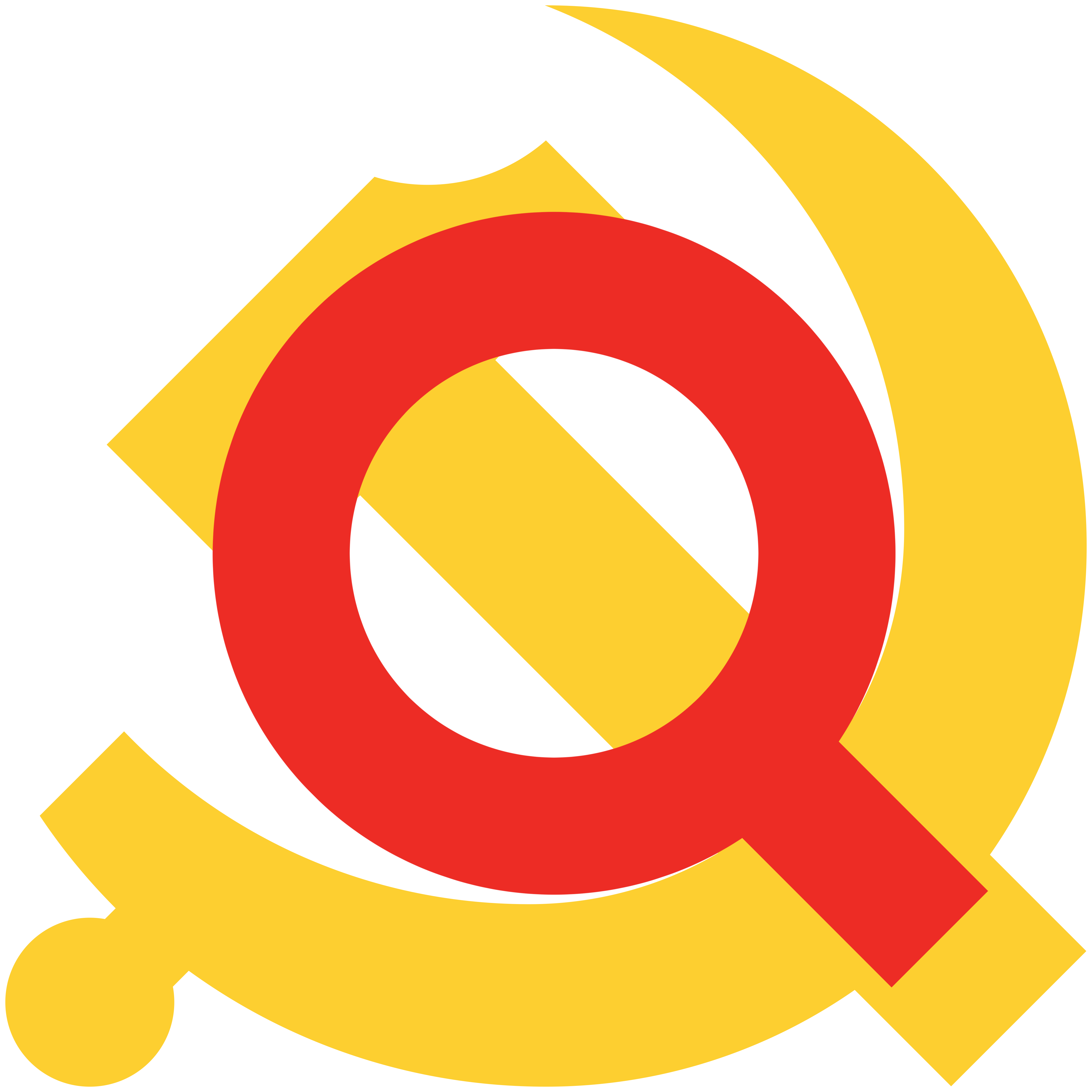To protect fragile westerners from a billion Chinese people who would otherwise be trolling the shit out of them for being ignorant dumbasses.

average chinese netizen
Chen Weihua was simply a taste of what Westerners would experience if hundreds of millions of Chinese netizens, a decent portion of whom probably have some English knowledge, flooded their pathetic echochambers.
The is the best reason because it is the funniest.
None of you seem to understand. I’m not locked in here with you. You’re locked in here with me.
Exactly. You can give this answer whenever some anti-China idiot tries to do a “gotcha”. On the other hand, if someone asks in good faith and is really interested in learning you should probably refer to what @ComradeSalad wrote as that’s the serious and correct answer.
For a serious answer, it creates a form of protectionism for Chinese internet service such as social media, websites, news sites, game services, and so on. Allowing more money to be maintained within the Chinese economy instead of that wealth being transferred to international companies.
This has allowed China to avoid relying on mega conglomerate services and develop their own home grown alternatives to every sort of website and services you could possibly need.
While this wouldn’t be possible for smaller nation like Cuba, or Vietnam to do because they lack the manpower, population, capital, and resources to maintain such a large base of home grown alternatives, China lacks none of those vital items, and thus it makes sense for them to develop their own.
For people that criticize the Great Wall, ask them how the Western internet developed. Due to being the first on the scene, the American internet essentially developed in its own bubble and “firewall” by extension of having virtually no other competitors until the early 2000’s. This allowed conglomerates like Microsoft, Google, Apple, and so on to take off without threat from foreign competitors. Was it wrong for China to design a similar ecosystem to support their fledgling internet based economy?
I had this conversation with qwename actually, it’s not actually proteccionism but simply failing to comply with chinese regulations. Microsoft does operate in China because they did comply with regulations.
Which is still protectionism. International companies must still partner with a Chinese firm if they wish to operate in China. That accomplishes the exact same thing. Protectionism isn’t only just a hard block on operating in a country.
Facebook, google, and the others in the big five are giant western survelliance arms of the US state, funneling and storing communications, no matter how small or trivial, into their data farms. The power for propaganda, social media influence, advertising, and regime change / coups isn’t something we can even put limits on at this point.
Countries who allow this surveillance by foreign powers are extremely naive; your country’s comm systems should be owned and controlled by those states themselves.
The PRC is way ahead of the curve on this, whereas countries like India or those in Europe for example naively let the US control 99% of their social media landscape.
This isn’t isolationism either, If you want to let foreigners join and use your own social media, that’s perfectly fine, but it should ultimately be under your own control.
There’s a second huge aspect to this which is allowing domestic industry to develop. There’s a reason that China and Russia are basically the only countries that have their own domestic alternative to Google, FB, and Amazon. Letting in giant US companies unchecked means that local companies will never have a chance to get off the ground. Ensuring digital sovereignty is just as important as having control over the media space.
In a single sentence: The Internet is not outside the law. (网络不是法外之地)
Many comrades have mentioned economic or ideological aspects of the GFW, but ultimately everything has to be written in law.
Let’s start with a simple example of online content that would be banned even outside China, something that westerners will agree with: child pornography. In this case it’s very obvious that any platform (I will use this to refer to any website or app) that wants to operate legally will ban child pornography.
Next example that has mixed opinions: pirated music/movies/shows/games/books/etc. Some might be familiar with the USA’s DMCA (Digital Millennium Copyright Act) takedown notice that caused various pirate sites to close. Some legal Chinese platforms do host pirated movies/shows, probably because the copyright owners haven’t contacted them, but most of the time pirate platforms that look like Chinese platforms are actually based overseas because they are obviously against Chinese copyright laws.
Last example that I think is the most controversial: “free speech”, usually referring to political criticism and discussing “sensitive” incidents. While some terms are filtered/blocked online, this doesn’t mean that people can’t discuss them with substitute terms. The guidelines for what you can post varies from platform to platform, and also depends on the user qualifications.
Users have to be responsible for what they post, platforms have to be responsible for what they host, and regulators have to be responsible in ensuring that platforms are doing their job.
While I haven’t found any official Chinese government sources that directly mention the GFW, there are certainly laws and regulations regarding cyberspace, starting from “Measures on Ensuring Security of Internationally Connected Computer Information Networks” in 1997 (计算机信息网络国际联网安全保护管理办法, https://www.cac.gov.cn/2014-10/08/c_1112737294.htm). You can read more about the development of China’s cyberspace in the white paper “China’s Law-Based Cyberspace Governance in the New Era” here: http://english.scio.gov.cn/whitepapers/2023-03/16/content_85172148.htm, a summary of the legal process regarding cybersecurity is in section 2 of this white paper: http://english.scio.gov.cn/whitepapers/2023-03/16/content_85172148_4.htm.
In this short regulation mentioned above from 1997, Article 5 basically outlines everything that is illegal online, there are many more laws and regulations since then but this is a pretty good summary: (English translation from DeepL)
第五条 任何单位和个人不得利用国际联网制作、复制、查阅和传播下列信息:
(一)煽动抗拒、破坏宪法和法律、行政法规实施的;
(二)煽动颠覆国家政权,推翻社会主义制度的;
(三)煽动分裂国家、破坏国家统一的;
(四)煽动民族仇恨、民族歧视,破坏民族团结的;
(五)捏造或者歪曲事实,散布谣言,扰乱社会秩序的;
(六)宣扬封建迷信、淫秽、色情、赌博、暴力、凶杀、恐怖,教唆犯罪的;
(七)公然侮辱他人或者捏造事实诽谤他人的;
(八)损害国家机关信誉的;
(九)其他违反宪法和法律、行政法规的。
Article 5 Any unit or individual shall not utilize the international network to produce, copy, access and disseminate the following information:
(1) incitement to resist or undermine the implementation of the Constitution and laws and administrative regulations;
(2) incitement to subvert state power and overthrow the socialist system;
(3) inciting to split the country and undermine national unity;
(4) inciting ethnic hatred or ethnic discrimination and undermining national unity;
(5) fabricating or distorting facts, spreading rumors and disturbing social order;
(6) Promoting feudal superstition, obscenity, pornography, gambling, violence, murder, terror, and abetting crimes;
(7) openly insulting others or fabricating facts to slander others;
(8) Damaging the credibility of state organs;
(9) Other violations of the Constitution and laws and administrative regulations.
People have different opinions on what should or shouldn’t be allowed online, that’s fine. Currently most non-Chinese platforms are able to host a wider variety of content than Chinese platforms, they definitely have more “freedom” in this regard.
I should also mention that all platforms operating in mainland China are required to have an ICP record (ICP备案), regardless of whether the operator is a person or company, and companies have additional requirements like ICP license (ICP许可证). Now we have to look at how these laws and regulations regarding online content can be enforced.
In the case of local platforms operating within China, regulators can contact the relevant platform to takedown or censor any offending material, just like how normal users can report content for moderators to review, though regulators probably have special communication channels with platforms. Local platforms probably have internal guidelines for what is acceptable content based on their interactions with regulators, and will use them proactively to avoid attracting unnecessary attention from regulators, often to the detriment of user experience (like shadowbanning posts/comments that mention “sensitive” terms).
For foreign platforms operating outside China, I can only guess that the first step is to send an email requesting a takedown. If that fails then maybe the actual GFW will come into the picture. Though major western social media platforms (Facebook, Twitter/X, YouTube, etc.) are blocked by the GFW as expected, some news outlets like CNN, AP aren’t blocked, while others like NYT or WP are blocked. Lemmygrad.ml isn’t blocked but lemmy.ml, hexbear.net and prolewiki.org are. Google search and Duckduckgo are blocked but Yandex and VK aren’t. There is a lack of transparency in this regard as to which platforms are blocked for which reason. (Note that Microsoft’s Bing and other products are operating legally in China, with their ICP license and all that stuff.)
Personally these are some of the reasons why I think a foreign platform is not yet blocked by the GFW:
- nobody reported the platform to regulators
- the platform isn’t popular enough to attract attention
- the platform isn’t popular enough among Chinese netizens
- the platform does not contain illegal content
The GFW is a natural consequence of enforcing cyberspace legislation. The Internet is not outside the law. Though it may seem like the Internet exists somewhere in the clouds, the supporting infrastructure is real and concrete, and thus all platforms are subject to local laws and regulations. Most online platforms have their own methods of moderating content, their own Terms of Service (ToS), and their own share of DMCA-like takedown notices. Since foreign platforms do not have a legal obligation to Chinese takedown requests, the GFW becomes the only remaining option for cyberspace law enforcement.
As the Internet is the most powerful channel for manipulating the flow of information in this day and age, we should not allow capitalists to become the main legislators of the Internet. It is not a question of why any country should have a GFW, but who should be in control of it when it inevitably exists.
deleted by creator
To disrupt American/Western propaganda. What you tell them is that the FBI takes down DNS regularly and this most recent TikTok ban is part of the same behavior.
all countries have firewalls, china is just more open about theirs, and they are more liberal in its use. it kinda just makes sense to block stuff sometimes, the shear amount of propaganda coming from the west is staggering.
1-because you can escape foreign control if you have your own social media
2-probably something like: you only know “internet” as facebook, twitter and google, the rest doesn’t exist for you anyways!
Here’s a good explainer:
Note that the video is much older than 3 years, its previous channel was banned. Relevant to the prediction made at the end.
I found a YouTube link in your comment. Here are links to the same video on alternative frontends that protect your privacy:










